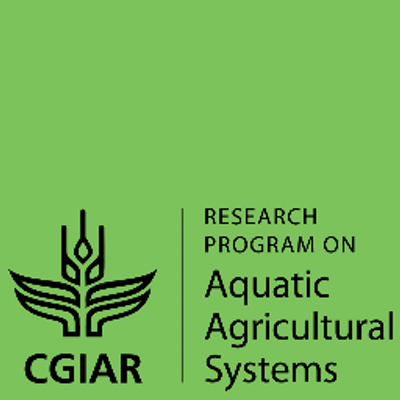Résultats de la recherche
Displaying 1 - 2 of 2 results.
Research in Development: the approach of Aquatic Agricultural Systems
The CGIAR Research Program on Aquatic Agricultural Systems (AAS) is pursuing a Research in Development approach that emphasizes the importance of embedding research in the development context. Reflecting this emphasis the six elements of this approach are a commitment to people and place, participatory action research, gender transformative research, learning and networking, partnerships, and capacity building. It is through the careful pursuit of these six elements that the program is believed to achieve the desired development outcomes.
Sujet(s):
Année de publication:
2008Participatory Impact Pathways Analysis: a practical method for project planning and evaluation
Participatory Impact Pathways Analysis (PIPA) is a practical approach to planning, monitoring and evaluation, developed for use with complex research-for-development projects. PIPA begins with a participatory workshop where stakeholders make explicit their assumptions about how their project will make an impact, and produce an ‘Outcomes logic model’ and an ‘Impact logic model’. These two logic models provide an ex-ante framework of predictions of impact that can also be used in priority setting and ex-post impact assessment.
Sujet(s):
Année de publication:
2008Sorting block
Filtrer par idiome
Filtrer par sujet(s)
- capacity development (CD) (1) Apply capacity development (CD) filter capacity development (CD)
- learning (1) Apply learning filter learning
- monitoring and evaluation (M&E) (1) Apply monitoring and evaluation (M&E) filter monitoring and evaluation (M&E)
- multi-stakeholder processes (1) Apply multi-stakeholder processes filter multi-stakeholder processes
- participatory approaches (1) Apply participatory approaches filter participatory approaches
- research (1) Apply research filter research
Filtrer par auteur(s)
- (-) Remove Douthwaite B. filter Douthwaite B.Douthwaite B.
- Abreu L. S. De (2) Apply Abreu L. S. De filter Abreu L. S. De
- Alvarez S. (1) Apply Alvarez S. filter Alvarez S.
- Barbosa T. M. F. (1) Apply Barbosa T. M. F. filter Barbosa T. M. F.
- Batistella M. (1) Apply Batistella M. filter Batistella M.
- Berhe K. (1) Apply Berhe K. filter Berhe K.
- Brenes R. (1) Apply Brenes R. filter Brenes R.
- Brienza Junior S. (1) Apply Brienza Junior S. filter Brienza Junior S.
- Buschinelli C. C. De A. (1) Apply Buschinelli C. C. De A. filter Buschinelli C. C. De A.
- Celestino Filho P. (1) Apply Celestino Filho P. filter Celestino Filho P.
- Douthwaite B. (1) Apply Douthwaite B. filter Douthwaite B.
- Ferreira J. N. (1) Apply Ferreira J. N. filter Ferreira J. N.
- Food and Agriculture Organization of the United Nations (FAO) (2) Apply Food and Agriculture Organization of the United Nations (FAO) filter Food and Agriculture Organization of the United Nations (FAO)
- Global Donor Platform for Rural Development (1) Apply Global Donor Platform for Rural Development filter Global Donor Platform for Rural Development
- Hartwich F. (1) Apply Hartwich F. filter Hartwich F.
- Hoekstra D. (2) Apply Hoekstra D. filter Hoekstra D.
- Homem V. S. F. (1) Apply Homem V. S. F. filter Homem V. S. F.
- International Center for Tropical Agriculture (1) Apply International Center for Tropical Agriculture filter International Center for Tropical Agriculture
- Janssen W. (1) Apply Janssen W. filter Janssen W.
- Maru A. (1) Apply Maru A. filter Maru A.
- Mattos L. M. De (1) Apply Mattos L. M. De filter Mattos L. M. De
- Moutinho P. (1) Apply Moutinho P. filter Moutinho P.
- Nahum B. S. (1) Apply Nahum B. S. filter Nahum B. S.
- Ortiz Aragón, A. (2) Apply Ortiz Aragón, A. filter Ortiz Aragón, A.
- Pehu E. (1) Apply Pehu E. filter Pehu E.
- Pesce V. (1) Apply Pesce V. filter Pesce V.
- Pinto E. De P. (1) Apply Pinto E. De P. filter Pinto E. De P.
- Puskur R. (2) Apply Puskur R. filter Puskur R.
- Qaim M. (2) Apply Qaim M. filter Qaim M.
- Quanz D. (1) Apply Quanz D. filter Quanz D.
- Rajalahti R. (1) Apply Rajalahti R. filter Rajalahti R.
- Ramsey, M. (2) Apply Ramsey, M. filter Ramsey, M.
- Schut M. (1) Apply Schut M. filter Schut M.
- Scopel E. (1) Apply Scopel E. filter Scopel E.
- Silva M. R. Da (1) Apply Silva M. R. Da filter Silva M. R. Da
- Sist P. (1) Apply Sist P. filter Sist P.
- Spielman, D. J. (2) Apply Spielman, D. J. filter Spielman, D. J.
- Stachetti G. (1) Apply Stachetti G. filter Stachetti G.
- Taylor, P. (3) Apply Taylor, P. filter Taylor, P.
- Tefera T. L. (1) Apply Tefera T. L. filter Tefera T. L.
- Tegegne A. (2) Apply Tegegne A. filter Tegegne A.
- Teka W. (1) Apply Teka W. filter Teka W.
- The World Bank (2) Apply The World Bank filter The World Bank
- Thiele G. (1) Apply Thiele G. filter Thiele G.
- Tourrand J. F. (1) Apply Tourrand J. F. filter Tourrand J. F.
- Veiga J. B (1) Apply Veiga J. B filter Veiga J. B
- Verma A. (1) Apply Verma A. filter Verma A.
- Watkins A. (1) Apply Watkins A. filter Watkins A.
- World Bank (8) Apply World Bank filter World Bank
- Xaud M. R. (1) Apply Xaud M. R. filter Xaud M. R.


